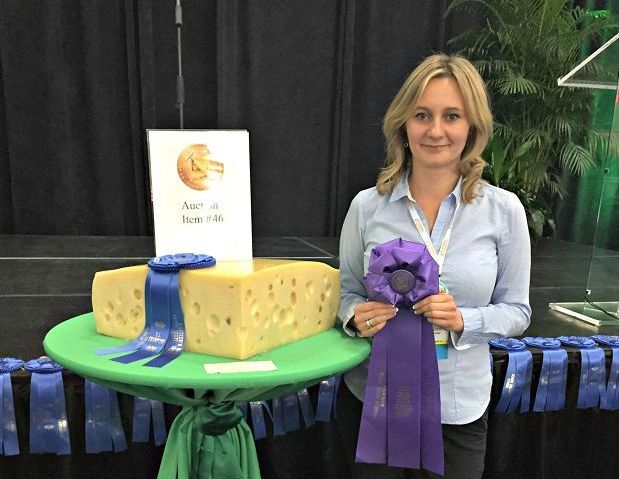It aint easy being cheesy: Szewczyks journey to becoming a champion cheese-maker
Poland native Cecylia Szewczyk would never have told you she would become a cheese-maker.
Szewczyk, who spends her free time watching the Food Network one of her favorite shows is Restaurant Impossible with chef Robert Irvine would have told anyone she was going to be a lab researcher or a chef.
I thought I would study how different bacteria strains interact with each other, she said of her original career goal. But its so specific to different production lines that you have to be in the plant to test anything.
She also turned down working as a chef because of the stress associated with the job. The reality of being a chef is different than what I thought, she said. I am happy to be a cheese-maker because it is a noble profession.
Szewczyk began her journey to cheese-making in Poland when she left her hometown, Nowinka, to study chemical engineering for two years. She eventually switched her major to food technology and human nutrition, with a major in food biotechnology at the University of Warmia and Mazury.
She also studied at the Technological Educational Institutions of Athens, Greece.
Tetrak Pak, a Swedish company specializing in the safe packaging and distribution of liquid products, considered her as one of the best in her class. Although she didnt win the companys internship, she was offered a job as a technologist at CSK Food Enrichment.
She said she produced all sorts of dairy products there, but fresh cheeses became her favorite to produce. Those are the hardest, Szewczyk said, because you have to have knowledge of the living milk and all the physical, biological and chemical processes going on.
Szewczyk said each time she makes a cheese, she has to think about the way the bacteria used to make the cheese will grow, like an animal, in the milk, the way enzymes will break down during the aging process and how pressing and cutting the cheese will effect its taste and consistency.
But no matter how careful she is, she said the end result wont be available until about three months later when the cheese is properly aged. Every day you could think you made the best cheese in the world, she said, and three months later you cut it open and its all (ruined).
Any product defects or mistakes lead to whole batches of cheese being ruined, she said, and pinpointing the defect is not always easy because of the complex processes involved in production. Sometimes its very discouraging, she said. But its your life. It is also a challenge. When Im faced with a challenge I sink into it deeply to figure out the problem.
Cheese is a science and an art.
Not only does making an established recipe take time, Szewcyzk said developing a recipe for a new cheese takes years. You have to repeat and age, repeat and age, repeat and age, she said, until you get it right.
Szewcyzk spent two years creating a new cheese to market in Russia. It turns out Russians like stinky cheese, she said. We wanted to make them a cheese that smelled like rotten eggs.After the years of research and testing, Szewcyzk said she created a cheese that ended up being the best-selling cheese in Russia and a top contender in France. But it would never sell anywhere else, she said.
After years of education and cheese-making in multiple countries, she and her team Szewcyzk currently works as a natural cheese specialist and a liaison between French production equipment supplier Chalon Megard and Guggisberg Cheese have won the 2015 U.S. Champion Cheese Contest.
Although she is mainly working to tweak established recipes to work with new production lines being installed at Guggisberg, Szewcyzk is still working on new cheeses.
Szewcyzk may have never thought she would be a cheese-maker, but she said the job has its perks. My favorite part about cheese-making is actually the end product, she said. My favorite cheese is bleu.

